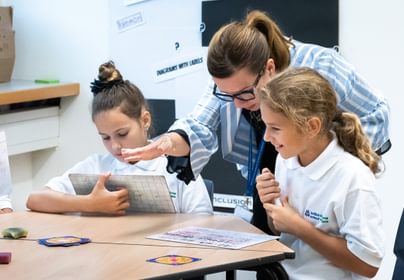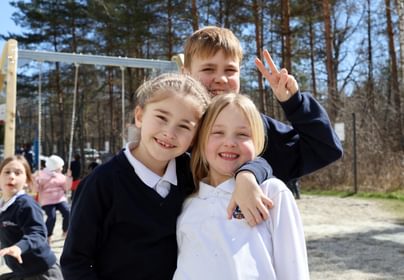A word from Ms Andronikos
Another busy week at BISL beginning with a thought-provoking assembly presented by Mr Batson and some of the Sixth Form students. His topic; lifelong learning and its significance. He mentioned that enhanced levels of serotonin lead to faster learning. In other words, a good mood means improved learning and learning also puts you in a good mood! Mr Batson gave details on the importance of improving ‘cognitive reserve’ which is that if you keep learning to exercise your brain, it boosts cognitive reserve which is your body’s prevention against brain illness. To emphasize the importance of learning over time, Sixth Form students Iza, Nicholas and Adrian gave some examples from their own experiences.
Never underestimate what you are learning now.”Nicholas, Sixth Form studentIt was great to see all students reflecting upon their journey at school, and a reminder that all lessons are meaningful.
Additionally, this week, the Year 9 and 10 students went on their ski trip. These experiences are so important for students to be able to enjoy these trips and perhaps learn new skills with their classmates. They are often pushed a little out of their comfort zone which builds upon their cognitive reserve, whilst having fun with their friends. A big thank you to the staff who attended; Mr Damjan, Mr Rogers and Ms Ross. This week the senior students will attend their trip.
One last event finished the week off - the Blood Drive. A record number of students, teachers and parents participated and all for a fantastic cause. Thank you to all who attended.
Have an enjoyable weekend and I challenge everyone to do something that improves cognitive reserve.
Stephanie Andronikos
Head of Secondary
News from Science
We would like to share some of the fantastic recent work we are receiving in the Science Department. This week we have included 2 examples of Year 9 Blogging on extinction and pollution (My Machine Themes) Congratulations also to Divyansh of Y8B on winning this week’s Science award in recognition of his outstanding work.
Mr Cox
Head of Science
News from MFL
Saturday, 8th of February is a public holiday here in Slovenia, known as Prešeren day or Cultural day. We commemorate the death of France Prešeren (1800-1849), a Slovene poet who is also the author of our national anthem.
As part of the traditional celebrations most museums and galleries will be open with free admission so it might be a great opportunity for a visit.
Miss Kotnik
MFL Coordinator
News from EAL
In our EAL lesson, we were learning how to use fronted adverbials and adverbial phrases in the context therefore Year 7 student, Filip Pilih, conducted the interview with his form tutor Mrs Poulet. ''Without warning, I came into the French classroom and asked Mrs Poulet if she has time to do an interview. Without hesitation, she accepted and started answering all of my questions. First, I asked her if she could invite anyone to dinner, dead or alive, who would it be and she replied that it would be Mrs Nerma because she is really funny. Next, I asked her what is her favourite country to visit and she answered Italy. Also, if she could change anything at school she would get the students a bigger basketball playground. She feels good in her position, however, when she was a child she wanted to be a farmer because she loves working with animals and if she could be an animal she would be a cat because everybody looks after you. When I asked her about her dream car, she hesitated for a while and after a few seconds replied that it is a Volkswagen Van but if she could choose anything in the world, she would go around the world by train. Fortunately, she decided to come and live in Slovenia because this is where her husband lives and she loves cold, white winters. And guess what, she also loves to doodle, a lot!''
MEPI News
After a little brush-up on the theory in the classroom, our intrepid 2019-2020 MEPI cohort met at Tivoli Park last Sunday morning to put their map and compass skills to the test! Good weather, beautiful scenery, and a slightly cryptic clue sheet culminated in coffee at the lakeside cafe. A relaxed debrief brought a successful morning to a satisfactory close.
Mr Irving
MEPI Coordinator
Cambridge Essay Competition
We were delighted and proud this week to learn that 2 of our students from Year 10 - Max and Noah were chosen as winners in the recent Immerse Education Cambridge Essay Competition. They both won a 2 week scholarship at a Cambridge Summer School.
Well done to them, this is truly impressive and we hope they enjoy the prize.
Year 9 and 10 Ski Trip
We have just received a couple of photos from the year 9 and 10 ski trip via the wonders of technology and it looks like it is a very fine day up there indeed!
Student News
How Singapore Gets Rid of their Trash
Trash is a big problem in many if not all countries in the world. Most trash is dumped into a landfill or into the ocean. In the ocean trash harms animals and pollutes the environment, especially plastic.
But Singapore has found a way that is 100% clean. First they burn all of the garbage that they have collected. What happens is the fire basically eats the trash away, while it provides heat and energy which powers houses and the city. But burning trash releases toxic gases. The people in Singapore developed a filter that they fit on top of their incineration plant. The air that is filtered is very clean. The air is smaller than 1 micron, meaning it is cleaner than most air around you right now. This is how 90% of Singapore’s trash is disposed of. But what about the other 10%?
Well the 10% is turned to ash. They take this ash and take it far away to a man-made island. They dumb the ash into a special water that doesn’t touch the ocean. The ash stays underwater forever. This process is so clean, that the corals are still alive. The island is completely safe. It looks like a resort due to the trees still being alive and organisms living there. Meaning the process is clean.
To conclude, Singapore took a big problem and turned into clean air and a small island. Other countries should take inspiration from this and develop their own environment friendly way of getting rid of trash.
Filip
Year 9
Extinction - The Red Wolf
Red wolves are facing extinction, and not only in the wild.
After the capturing of the red wolves in 1980, in order to start a breeding program, the species of red wolves have been declared extinct in the wild. (According to the Center of Biological Diversity). Although different sources such as ‘National Geographics’ suggest that there are about 35 individuals of the red wolves left in the wild
For the breeding program in the US to work, the population of the red wolves has to be increased from what is now anywhere between 35 to 400. Scientists hope to achieve this increase in their population as soon as possible. Since their last attempt in 1987, (according to the Center of Biological Diversity), four pairs of the red wolves species had been released that year and the population managed to climb up to 130 individuals by 2006 until their dramatic decrease, and are now classified as ‘critically endangered’.
Ole
Year 9
Max’s Moment - A Student’s Perspective
Hello Everyone! Welcome back to ‘Max’s Moment.’
I hope everyone has had a good week-only one more to go! This Friday, years 9-10 have their ski trip, so us students in KS4 are all eagerly awaiting the adventure. Unfortunately, the past couple of weeks have been stricken with many students, and even teachers being sick with the flu. However, this pattern is seemingly habitual across the whole of Slovenia. Approximately 40% of students across Slovenia have stayed home in recent weeks due to the virus. With another wave of flu being reported to hit next week, it is imperative for the health of every individual and those around them to stay wary of the virus- here are some healthy habits; The single best way to prevent seasonal flu is to get vaccinatedeach year, but good health habits like covering your cough and washing your hands often can help stop the spread of germs and prevent respiratory illnesses like the flu. There also are flu antiviral drugsthat can be used to treat and prevent flu. Ultimately, avoiding close contact with those infected, staying home when ill, covering your mouth and nose, and of course washing your hands repeatedly throughout the day is essential to prevent getting the infection. With most cases of the flu being reported during winter months, it is also very important to make sure you are warm in order to prevent the potential loss of body temperature which would therefore make it easier for the virus to infect the body. Although this all sounds depressing, it is very important to minimise the severity of the flu around school, in order to make sure everyone is all in tip-top shape to make sure everyone is as productive as possible, at least for the last push next week until our break!
Until next week, goodbye!



